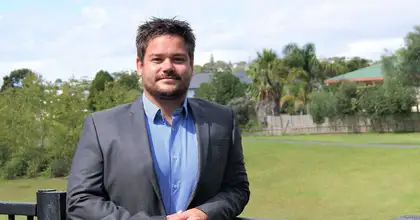
It was a love of science and asking questions that have never been asked before that led Tākuta Rodley from teen truant to top Māori scholar at Massey, and on to an international career in Science.
His successful academic career is a far cry from his days as a teenager who left Long Bay College aged 16, with no qualifications.
"I got in with the wrong crowd. I was bored."
But his lifelong fascination with science and genetics, always remained with him. After a spell of apple picking in the South Island, and several years as a bank teller in Auckland, restlessness and boredom compelled him to pursue his dream of becoming a medical researcher.
Encouragement from one of his former schoolteachers also helped to spur him on.
"I had to do a lot of independent study to fill in the gaps in my knowledge base. I made a lot of sacrifices to do well. I didn’t have much of a social life – I had to study ten to 12 hours a day.”
The hard work and dedication paid off. Tākuta Rodley was named top Massey Māori student for 2007, and was awarded a Pūrehuroa Māori Postgraduate Award in 2007 for excellence and achievement. He graduated with a Bachelor of Science in Molecular Biosciences with First Class Honours in 2008, and went on to win a Health Research Council of New Zealand Māori PhD scholarship worth $105,000.
One of the highlights of his time at Massey was being a finalist in the MacDiarmid Young Scientist of the Year competition. He also published three papers in international journals, which helped him obtain his current position.
“I really love science and asking questions that have never been asked before.”
Following his PhD, Tākuta Rodley went to Switzerland to work as part of an international team at the University of Geneva working on cancer cell research – but with a young family, New Zealand soon beckoned.
“My wife and I wanted to move back to New Zealand to buy a house and start raising a family. Unfortunately, with Auckland’s housing prices, I needed to get a job that was a bit more permanent than a post-doctoral fellowship. The most important thing in my life now, and looking into the future, is my family. I strive for a work-life balance, which allows me to be there for my kids.
He is currently seconded into a management position at the Ministry for Primary Industries, working in a team to verify that animal products are fit for export.
“A lot of this work is quite technical; ascertaining whether certain genetic modifications fall within specific approvals that the laboratory may hold. I still use the skills I learnt during my PhD and post-doctoral studies on a daily basis in my current position, evaluating whether laboratories are operating within approvals to genetically modify organisms. I really enjoy being out and about interacting with MPI’s external stakeholders within the containment community. The breadth of the work being done in New Zealand never ceases to amaze me and we have some amazingly smart people out there.”
A shining example of what can be achieved by young Māori in the sciences, Tākuta Rodley has used this experience to inspire high school students through a secondary school programme in Palmerston North.
"I have always tried to be active in encouraging young people, and especially Maori, into tertiary study. During my PhD I used to volunteer at a high school after hours to assist students with their Science questions and homework. Some of the stories from these students about their home life broke my heart and so anything I can do to encourage them into a fruitful career in anything I think is worth the effort. With our current schooling, tertiary education, and student loan framework everyone has an opportunity to make a difference in their own life and their future children’s lives. It might take years and years of part time study, but the rewards at the end are worth that effort."
“Science is one of those areas where interest in the subject is important. It is about asking questions, wanting to know answers, being inquisitive, and just generally having a thirst for knowledge. I believe this mind-set has to start at home; rather than providing the answer to a question, help the young person to process the problem and brainstorm possible answers and then narrow it down to the actual answer. I think we, as a country, are heading in the right direction to bring Maori science statistics in line with non-Maori by providing secondary school programmes.”
Tākuta Rodley is not done with education himself. He came back to Massey last year to start a Post-Graduate Diploma in Business at Massey extramurally.
“During my undergraduate degree I wish I had of picked up business papers, or similar, as elective papers. These skills are so important out in the work force and having an understanding of how businesses and management operate gives you a unique perspective and makes you a more rounded employee.”